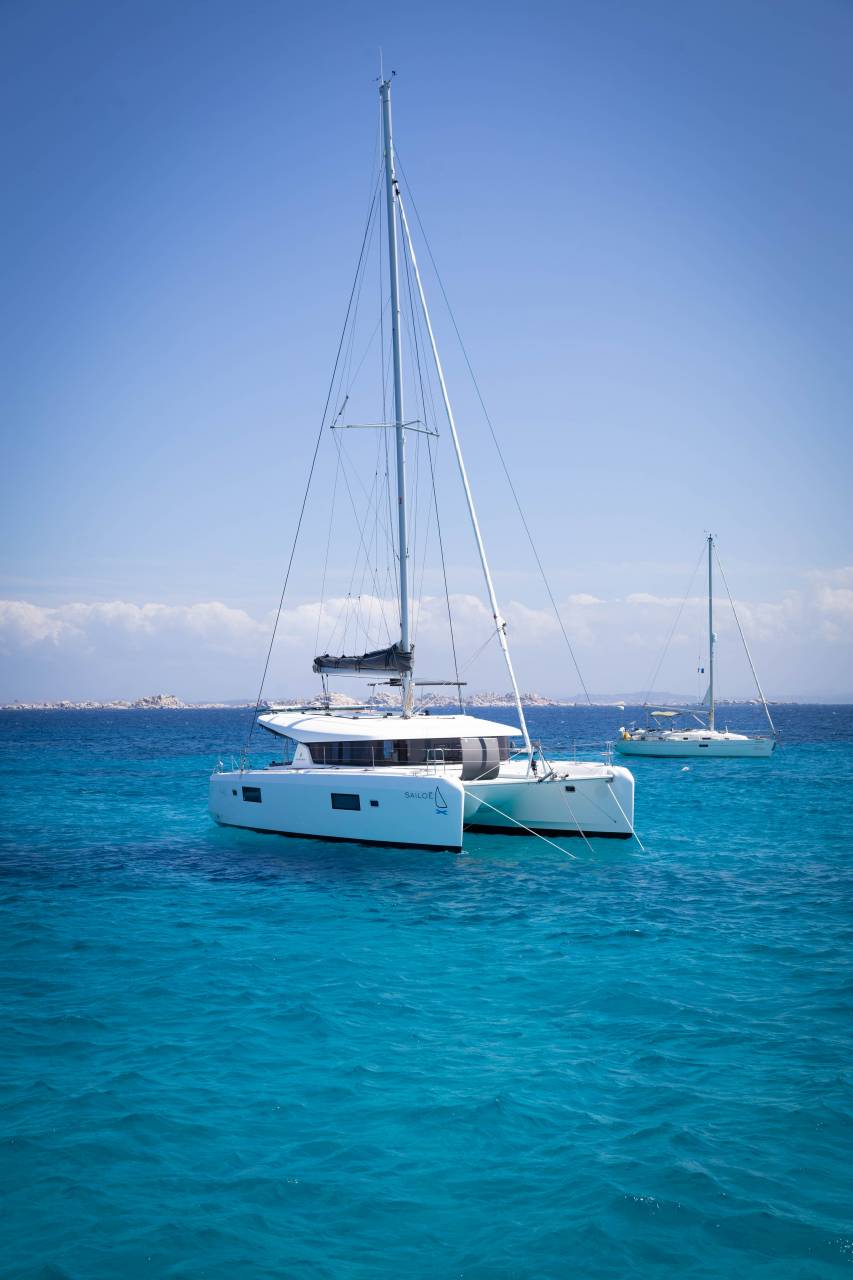If you're considering renting a catamaran for independent sailing, here are some important points to take into account:
Navigation Experience: It's essential to have adequate navigation experience before taking charge of a catamaran for independent sailing. Make sure you have the necessary skills to navigate safely and understand local navigation rules.
Navigation License: Check the navigation license requirements in the region where you're renting the catamaran. In some places, a valid navigation license might be mandatory.
Familiarity with the Boat: Before taking control of the catamaran, familiarize yourself with its equipment, navigation systems, controls, and emergency procedures. If necessary, request a brief training session on the boat's operation from the rental agency.
Port Maneuvers: Port maneuvers with a catamaran might differ slightly from those performed with a monohull due to the increased width of the hull. Here are some general tips for port maneuvers with a catamaran:
Preparation: Before entering the port, ensure you have accurate knowledge of the port conditions, including currents, winds, and potential obstacles. Also, check that your mooring lines and fenders are properly prepared.
Approach: Slow down sufficiently when approaching the port to maintain precise control of your catamaran. Be aware of the effect of wind and currents on your maneuverability.
Use the Engines: Engines play a crucial role in port maneuvers with a catamaran. Use them to adjust your speed and direction, keeping in mind that both engines should operate symmetrically to maintain balanced maneuverability.
Anticipate Drift: Due to the width of the hulls, catamarans can drift more easily in currents and winds. Take this drift into account during your port maneuvers and adjust your trajectory accordingly.
Cross-Tie Mooring: To secure your catamaran in the port, use cross-tie mooring (one forward and one aft line on each side). This will help keep the catamaran stable and prevent excessive movement.
Be Environmentally Aware: During port maneuvers, constantly monitor the environment, including other boats, docks, and potential obstacles. Communicate with your crew to ensure efficient coordination.
Itinerary Planning: Create a detailed itinerary plan considering the duration of your stay, navigation distances, weather conditions, and sites you wish to visit. Make sure to allocate enough time to move from one place to another and enjoy anchorages.
On-Board Safety: Ensure the catamaran is equipped with all necessary safety equipment, such as life jackets, fire extinguishers, distress flares, a first aid kit, VHF radio, etc. Also, check the condition of safety equipment before heading out to sea.
Provisioning Management: Plan your food and water supplies based on the duration of your stay and the availability of supplies in the areas you intend to visit. Also, check local regulations regarding waste disposal and environmental respect.
Water Supply: Water supply is essential to ensure comfort on board a catamaran. Here's some information about water supply and comfort-related services:
Water Tanks: Catamarans usually come equipped with on-board water tanks to store a sufficient amount of fresh water. Tank capacity can vary based on the catamaran's size, but they're designed to meet the needs for drinking, cooking, showering, and other uses on board.
Potable Water Supply: While in port, you can replenish potable water using port facilities such as water stations. Some ports offer free water stations, while others might charge fees for water supply. At-Sea Water Refilling: When sailing at sea, it's important to have enough fresh water for the duration of your trip. For longer journeys, you might consider installing a seawater desalination system on board to produce fresh water from saltwater.
Refilling Services: Some ports and marinas offer water refilling services, where you can have your water tanks refilled on the catamaran. These services might be available for an additional fee, so be sure to check rates and availability in advance.
On-Board Comfort: In addition to water supply, modern catamarans are equipped with various facilities to ensure on-board comfort. This might include toilets and showers, a equipped kitchen, air conditioning or heating systems, spacious living areas, comfortable beds, etc. The onboard services provided can vary based on the catamaran's model and specific equipment.
It's important to note that water services can vary depending on the destination and the facilities available in different ports and marinas. It's recommended to plan your water supply in advance and consult nautical guides, port websites, and local information for specific details about services available in your sailing area.
Weather Forecast: Regularly monitor local weather forecasts and adjust your itinerary accordingly. Avoid sailing in bad weather or dangerous weather conditions.
By following these tips and being well-prepared, you can fully enjoy your experience of independent catamaran sailing. Remember to be vigilant, follow safety rules, and appreciate the beauty of the marine landscapes you'll discover during your journey.
Autonomy training courses are offered for sailors who wish to acquire the necessary skills for independently maneuvering catamarans. These courses are usually provided by sailing schools or specialized training centers.
During these autonomy courses, you can expect to learn and practice techniques specific to catamaran maneuvering, including port maneuvers, anchoring maneuvers, sail and engine management, navigation in various conditions, etc. The courses are typically conducted by experienced instructors who will guide you throughout the learning process.
These courses are often tailored to different skill levels, ranging from beginners to more experienced sailors looking to enhance their catamaran maneuvering skills. They can be organized over a period of a few days to several weeks, depending on the program and intensity of the course.
If you're interested in a catamaran autonomy course, I recommend reaching out to sailing schools or training centers in your region. They can provide you with detailed information about the courses offered, prices, prerequisites, and availability.
We offer skippered charters in Corsica, Seychelles, the Caribbean, and Brittany.











